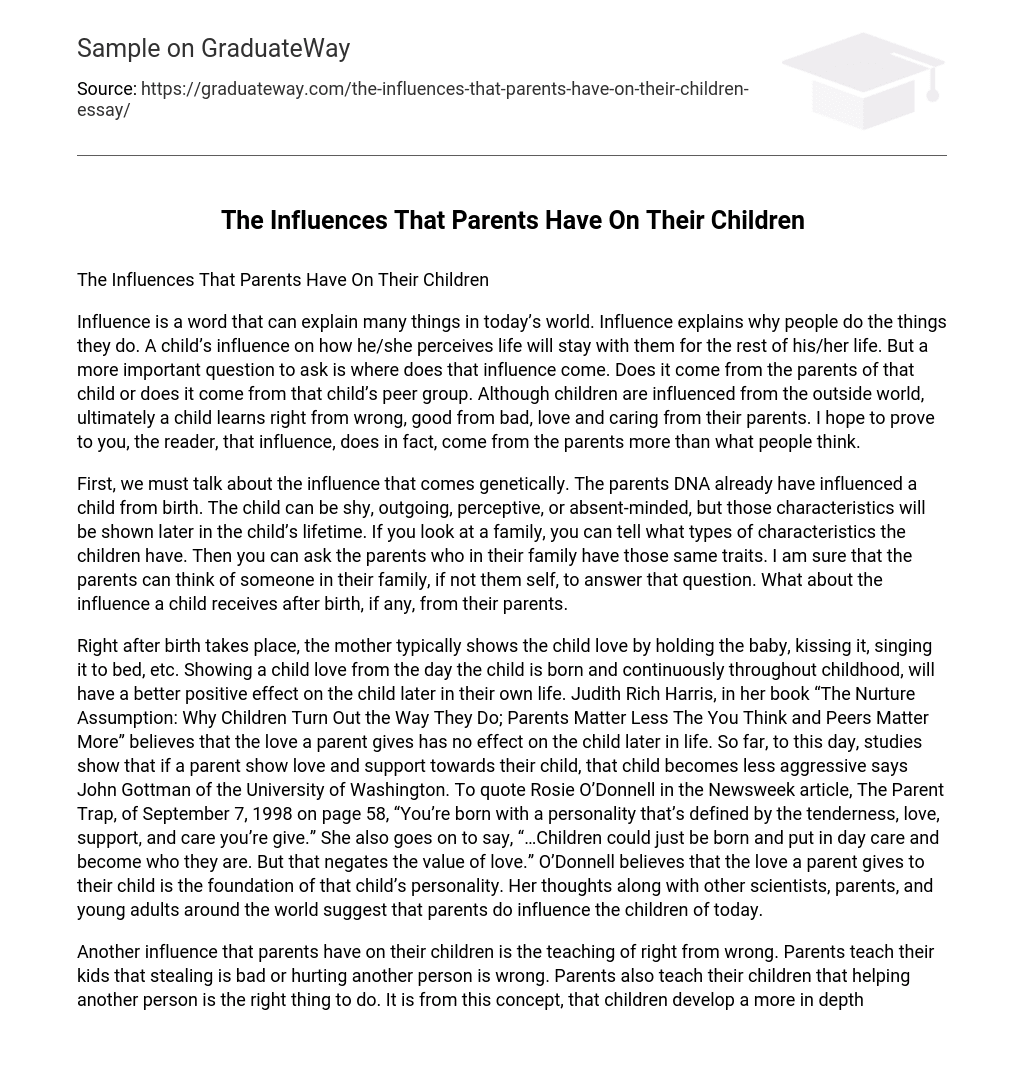The Impact of Parents on Their Children
In today’s world, the concept of influence is highly important as it explains why individuals act and behave the way they do. The impact a child receives from their parents greatly shapes their view on life and has long-lasting effects. However, the key question remains: where does this influence come from? Is it primarily influenced by the child’s peer group or does it predominantly stem from their parents? While external factors do have an impact on children, ultimately it is from their parents that they learn morals, distinguish right from wrong, and develop an understanding of love and empathy. In this text, my goal is to demonstrate to the reader that parental influence plays a more significant role than commonly believed.
Immediately after birth, a mother typically demonstrates affection for her child through actions like holding, kissing, and singing the baby to sleep. Showing consistent love from infancy through childhood has a positive impact on the child’s future life. In her book “The Nurture Assumption: Why Children Turn Out the Way They Do; Parents Matter Less The You Think and Peers Matter More,” Judith Rich Harris suggests that parental love does not significantly affect a child’s future life. However, research studies indicate that when parents show love and support towards their child, the child tends to display less aggression according to John Gottman from the University of Washington.
In an article titled “The Parent Trap” published in Newsweek on September 7, 1998, Rosie O’Donnell argues that an individual’s personality is shaped by the tenderness, love, support, and care they receive right from birth. She emphasizes that dismissing the significance of love contradicts the idea that children can be placed in daycare settings and develop their identity independently. O’Donnell firmly believes that a parent’s affection lays down the foundation for a child’s character development. These perspectives find affirmation among other scientists, parents, and young adults across different countries who propose that parents indeed have influence over today’s generation of children.
The crucial role of parents in shaping their children’s values and ethics is highlighted. Parents impart important moral principles, such as the consequences of stealing or causing harm, and emphasize the significance of helping others. These teachings aid in developing a strong conscience in children, which impacts their decision-making skills. When faced with temptation to act wrongly, individuals take into account potential consequences due to parental influence. Consequently, many refrain from engaging in crimes like theft because they were taught that it is morally unacceptable. However, those involved in criminal activities often attribute their actions to a lack of parental guidance during childhood. This societal issue can result in situations where children have to depend solely on themselves.
Parents play a crucial role in shaping their children’s understanding of right and wrong. While there may be subtle differences between the two, the consequences of these actions may not always be severe. Parents show admiration when their children excel academically or help with household chores. Certain parents choose to give money or toys as rewards for good behavior in order to instill positive values. Conversely, parents also use punishment for negative behaviors such as earning low grades or coming home late at night, aiming to teach the child from their mistakes and prevent repetition. Ultimately, parents aim to educate their children about future responsibilities and provide guidance for adulthood. However, it is essential to acknowledge that some individuals may have a different perspective on this matter.
Some argue that young adults’ decisions are influenced by their peers and society. These choices, such as picking friends, selecting clothing, and determining romantic attractions, are generally based on the individual’s own emotions and experiences shaped by their parents. While friends may have some impact, it is challenging to change the teachings of parents acquired over many years. As individuals grow into adulthood, they will understand why their parents made specific choices in order to instill values that endure throughout life. Michael Jordan eloquently expresses this idea when he states, “I acknowledge that no one has had a greater impact on me than my parents. Their ethics and morals are my ethics and morals. It’s amusing but you don’t realize how much they shape you until you grow older and start seeing them reflected in your actions…” (Newsweek, 9/7/98, p.58)
Regardless of the circumstances, parents have a lasting impact on their children by shaping their future. Whether positive or negative, this influence is significant. Nevertheless, societal influences can also contribute to a child’s development and make predicting outcomes challenging. However, one thing is certain – a parent’s influence on their child will always be remembered.





